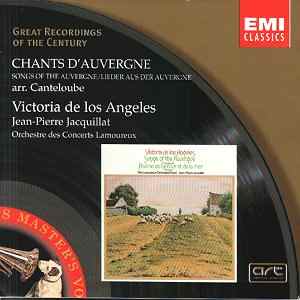
This series continues to proffer treasures from the EMI vaults. For the most
part what has been on offer has been the self-selecting headline-grabbers;
none the worse for that. The present recording is from that premium shelf
and is very well worth having.
These eminent recordings emanate from two LPs issued in the first half of
the 1970s. The sessions were in the Salle Wagram, Paris in 1969 and 1974
so they are analogue. Wagram is evidently a grand acoustic represented by
a warmly enveloping concert ambience. The voice is recorded fairly closely
without being intimidating. The orchestral firmament is spangled with riches,
subtle, full of life and glowing. The music is out of the palette of the
French impressionists and romantics. There is little ponderous about the
orchestral work. What a pity Jacquillat seems to have ceased recording after
about 1970s.
As for de los Angeles perhaps her Catalan origins gave her an enduring feeling
for these songs which are to traditional Auvergnat texts. The minority language
of this land of puys and volcanic drama must have been especially appealing.
Certainly she is in full sympathy with this winking, knowing, playful, innocent,
material. Te, l'co, te is the only track which completely defeats
de Los Angeles at least in company with Davrath's powerhouse celestial flights.
The celebrated (it has perhaps escaped association with that advert
now) Bailero is beautifully rolled but it is the edge-of-sleep dreaminess
of Pour l'Enfant (16) and the grand operatic L'Antoueno (6)
that command instant attention and enduring love.
De Los Angeles is in golden voice and her breath control is wondrous. She
coaxes her voice into the sound-set of youth and is utterly convincing. My
idiosyncratic preference for Netania Davrath's Vanguard CDs remains undisturbed.
Davrath is recorded very closely with plenty of staggeringly spotlit orchestral
details popping in and out of focus. Davrath is nonpareil in irresistibly
conveying the spirit of the young shepherdess. De Los Angeles brings a more
grown up intelligence to the word and music spinning. This artistry is superbly
partnered by the orchestra (clearly a big band) and the string textures
(startlingly Finzi-like sometimes as well as being touched with drenched-Mahler!)
are golden nectar by comparison with the 'authentic' village band sounds
conjured by de la Roche on Vanguard. The usual swings and roundabouts then.
I can recommend this disc alongside the Dawn Upshaw recordings and the Davrath.
Try to hear all three. The EMI is at mid-price and jostles for first place
amid a small field standing above quite a few versions in which operatic
heavy-weights and record companies with ambitions. Sadly some of these operatic
onslaughts have drowned the music deeper than the Titanic. De Los Angeles
is not in this category. Sweetness and the golden night itself.
Reviewer
Rob Barnett

PS anyone who loves these songs should petition the record companies to record
Edward McGuire's captivating settings of Gaelic Songs of the Hebrides - I
forget the exact title. A silvery magic plays and dances over these songs.
I first heard them sung with orchestral accompaniment by the wonderful Anne
Lorne Gillies (who has now taken to politics) in Stornoway in the Western
Isles in the late 1980s. I remember that performance still.
